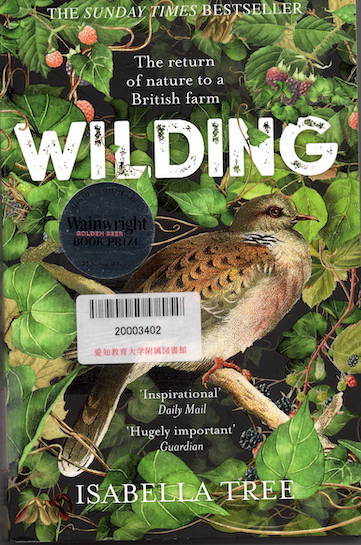
I read 'Wilding' in March 2021. Written by the
appropriately named Isabella Tree, it describes how she and her
husband
transformed their ancestral estate in West Sussex in the south of
England. Spurred by the fact that the farming they were
doing on less than fertile land was not proving to be financially
viable, they decided to effectively 'turn the clock back'
to an earlier environment. Although to the current population, it
may seem the 'natural environment', it has basically
been created by the aim to drastically increase agricultural
productivity, which has its roots in the Second World War
period. The writer describes how their 'wilding' project was an
opportunity to both help to reintroduce species which
were in sharp decline in Britain, not least migratory birds such
as the turtle dove and nightingale, while also trying to
restore the natural fertility of the land. This had been damaged
by repeated use of chemical fertilisers and insecticides.
Isabella Tree uses many sources including research to show the
benefits of both transforming vegetation and introducing
animals such as deer and Exmoor ponies to create a kind of synergy
which made the environment more welcoming to
'visitors' who had often disappeared under modern intensive
farming, including birds, beetles and butterflies. In addition,
other strategies were pursued such as returning the river flowing
through the estate to a more natural course by eliminating
its canal type course which had been created through Victorian
drainage schemes.
Not surprisingly, it was challenging. She and her husband faced
bureaucratic delays in dealing with government departments
which were responsible for providing finance. Other people in the
area often strongly objected to what was being done,
particularly as it created a untidy looking environment, in
contrast to the neat fields created by modern agriculture and its
aura of productivity. However, that opposition gradually
dissipated, partly through the project's successes. In particular,
it
was found that there was a kind of serendipity in the interactions
that took place between a wide range of creatures and
vegetation and that that was actually more successful in
attracting disappearing species than SSSIs (Sites of Special
Scientific
Interest) set up intentionally. In fact, she wants to avoid their
land being classified as an SSSI!
Although the author had a great advantage in possessing land as an
ancestral landowner, she and her husband have used
that benefit to create an environment which can show the benefits
that can be achieved by reconsidering modern agriculture,
which moves forward relentlessly aiming for greater and greater
efficiency, but at great costs.
See my previous
featured book.
